Education, Skills, and the Labour Market
It is undisputed that the human capital of a nation accumulated through schooling and lifelong learning is crucially important to the economy’s innovative capacity and ability to compete in the globalized world of the 21st century. At the individual level, human capital can be regarded as skills that make workers more productive in performing their work tasks and as the knowledge and competencies that enable people to generate and adopt new ideas that spur innovation. At the macroeconomic level, human capital can accelerate economic growth by increasing aggregate productivity and by facilitating the creation and diffusion of new technologies.
One stream of research in the group “Education, Skills, and the Labour Market” deals with the formation of skills. The focus is on family background, formal education, and on-the-job training as determinants of skill development. In terms of family influences, we see substantial intergenerational persistence between parents and children in income, educational attainment, and occupational choices. One source of this persistence is the intergenerational transmission of cognitive skills, as we show using unique Dutch data that link comparable measures of math and language skills over generations.
However, family circumstances are not “self-inflicted” and are beyond the control of the individual; Nobel laureate James J. Heckman coined them “accident of birth”. Thus, differences in family background and support are a source of inequality – the lack of equality of opportunity. We study the effectiveness of policies to support children and youths from disadvantaged families, in particular, early child care and mentoring programmes. However, one fundamental challenge with formally non-selective programmes such as universal child care is that disadvantaged families are often less able to access and utilize these programmes.
In a series of field experiments, we investigate why disadvantaged families are underrepresented in such programmes, focusing on both demand side reasons (e.g., lack of information or difficulties navigating complex application processes) and supply side reasons (e.g., discrimination of educational providers).
Related to our research on economic inequality at the individual level, we also study inequality at the regional level. Regional economic disparities, to a large extent driven by firms located in certain regions, can promote other forms of regional disparities. One such dimension in many western societies is the rise of radical right parties since the late 1980s. We contribute to this discussion by trying to understand the role of firm- und regional-level adjustments to globalization and technological change at the disaggregated European level. Particularly, we study how these significant economic changes affect vote shares of populist and nationalist parties because of the economic hardship caused by these phenomena.
Of particular interest in the research group “Education, Skills, and the Labour Market” is the intersection of labour market, education, and innovation research. As technology is changing the tasks workers perform at the job, automating certain tasks and introducing new tasks in which humans have a comparative advantage, the skills required from workers also change. A series of research projects aims at improving our understanding of the interplay between technology, skill supply, and skill demand.
For instance, we derive novel measures of worker skills by exploiting the unique setting of the German apprenticeship system, which mandates that the same practical and theoretical skills are developed in a particular apprenticeship regardless of the training location in Germany. Linking these skill measures to rich administrative labour market data, we estimate the returns to various types of skills developed during apprenticeship training, such as cognitive, social, digital, and manual skills.
Moreover, the analysis of apprenticeship plan updates will be informative about which types of skills have become more (or less) important over time, and how this interacts with the tasks that new technologies are able to perform. Furthermore, merging workers’ skill supply from apprenticeship plans with firms’ skill demand from online job vacancies allows us to investigate whether returns to skills are systematically higher in firms which require these skills. This will shed light on the complementarities between technologies and skills.
We also investigate the differences in entrepreneurship and business dynamism and their respective contributions to growth between the United States and Germany, particularly focusing on the significance of startups. While startups in the United States are well-known for their innovation and radical advancements, evidence suggests that Germany's innovation is more concentrated within established firms (i.e., incumbents). In a comparative analysis between Germany and the United States, we aim to delve into the preferences of high-skilled individuals for working in startups (vs. incumbents), to better understand the factors influencing startup activity and success in both countries.
In addition to the Germany-U.S. comparison, we will also shed light on the question to what extent the relatively low entrepreneurship rate in East Germany can be explained by individuals’ tastes for working in a startup. Starting from the observation that Germany is highly innovative and competitive despite having few startups, we then discuss how the German economy still maintains high levels of innovativeness and competitiveness.
Workpackage 1: (Unequal) Access to Education and the Formation of Skills
Workpackage 2: Returns to Skills
Workpackage 3: Innovation and Business Dynamism in Germany and the United States
Research Cluster
Productivity and InstitutionsYour contact

- Department Structural Change and Productivity
Refereed Publications
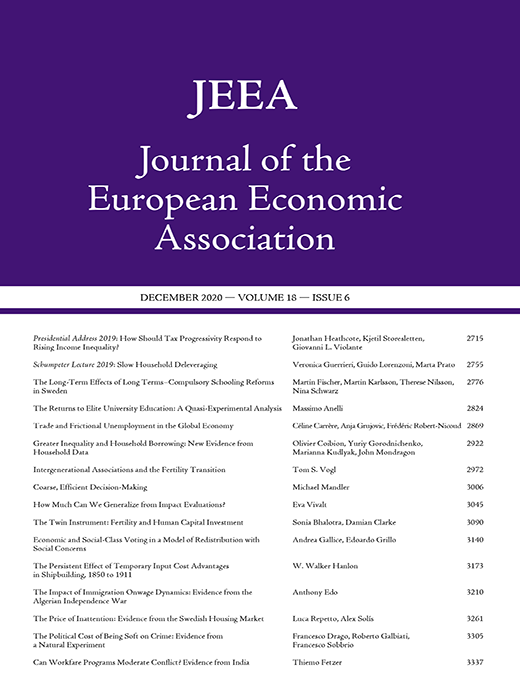
International Emigrant Selection on Occupational Skills
in: Journal of the European Economic Association, No. 2, 2021
Abstract
We present the first evidence on the role of occupational choices and acquired skills for migrant selection. Combining novel data from a representative Mexican task survey with rich individual-level worker data, we find that Mexican migrants to the United States have higher manual skills and lower cognitive skills than nonmigrants. Results hold within narrowly defined region–industry–occupation cells and for all education levels. Consistent with a Roy/Borjas-type selection model, differential returns to occupational skills between the United States and Mexico explain the selection pattern. Occupational skills are more important to capture the economic motives for migration than previously used worker characteristics.
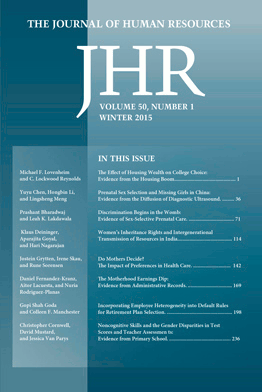
The Value of Smarter Teachers: International Evidence on Teacher Cognitive Skills and Student Performance
in: Journal of Human Resources, No. 4, 2019
Abstract
We construct country-level measures of teacher cognitive skills using unique assessment data for 31 countries. We find substantial differences in teacher cognitive skills across countries that are strongly related to student performance. Results are supported by fixed-effects estimation exploiting within-country between-subject variation in teacher skills. A series of robustness and placebo tests indicate a systematic influence of teacher skills as distinct from overall differences among countries in the level of cognitive skills. Moreover, observed country variations in teacher cognitive skills are significantly related to differences in women’s access to high-skill occupations outside teaching and to salary premiums for teachers.

Do Smarter Teachers Make Smarter Students?
in: Education Next, No. 2, 2019
Abstract
Student achievement varies widely across developed countries, but the source of these differences is not well understood. One obvious candidate, and a major focus of research and policy discussions both in the United States and abroad, is teacher quality.

Africa’s Skill Tragedy
in: Journal of Human Resources, No. 3, 2018
Abstract
We study the importance of teacher subject knowledge for student performance in Sub-Saharan Africa using unique international assessment data for sixth-grade students and their teachers. To circumvent bias due to unobserved student heterogeneity, we exploit variation within students across math and reading. Teacher subject knowledge has a modest impact on student performance. Exploiting vast cross-country differences in economic development, we find that teacher knowledge is effective only in more developed African countries. Results are robust to adding teacher fixed effects and accounting for potential sorting based on subject-specific factors.

Skills, Earnings, and Employment: Exploring Causality in the Estimation of Returns to Skills
in: Large-scale Assessments in Education, No. 12, 2017
Abstract
Ample evidence indicates that a person’s human capital is important for success on the labor market in terms of both wages and employment prospects. However, unlike the efforts to identify the impact of school attainment on labor-market outcomes, the literature on returns to cognitive skills has not yet provided convincing evidence that the estimated returns can be causally interpreted. Using the PIAAC Survey of Adult Skills, this paper explores several approaches that aim to address potential threats to causal identification of returns to skills, in terms of both higher wages and better employment chances. We address measurement error by exploiting the fact that PIAAC measures skills in several domains. Furthermore, we estimate instrumental-variable models that use skill variation stemming from school attainment and parental education to circumvent reverse causation. Results show a strikingly similar pattern across the diverse set of countries in our sample. In fact, the instrumental-variable estimates are consistently larger than those found in standard least-squares estimations. The same is true in two “natural experiments,” one of which exploits variation in skills from changes in compulsory-schooling laws across U.S. states. The other one identifies technologically induced variation in broadband Internet availability that gives rise to variation in ICT skills across German municipalities. Together, the results suggest that least-squares estimates may provide a lower bound of the true returns to skills in the labor market.
Working Papers
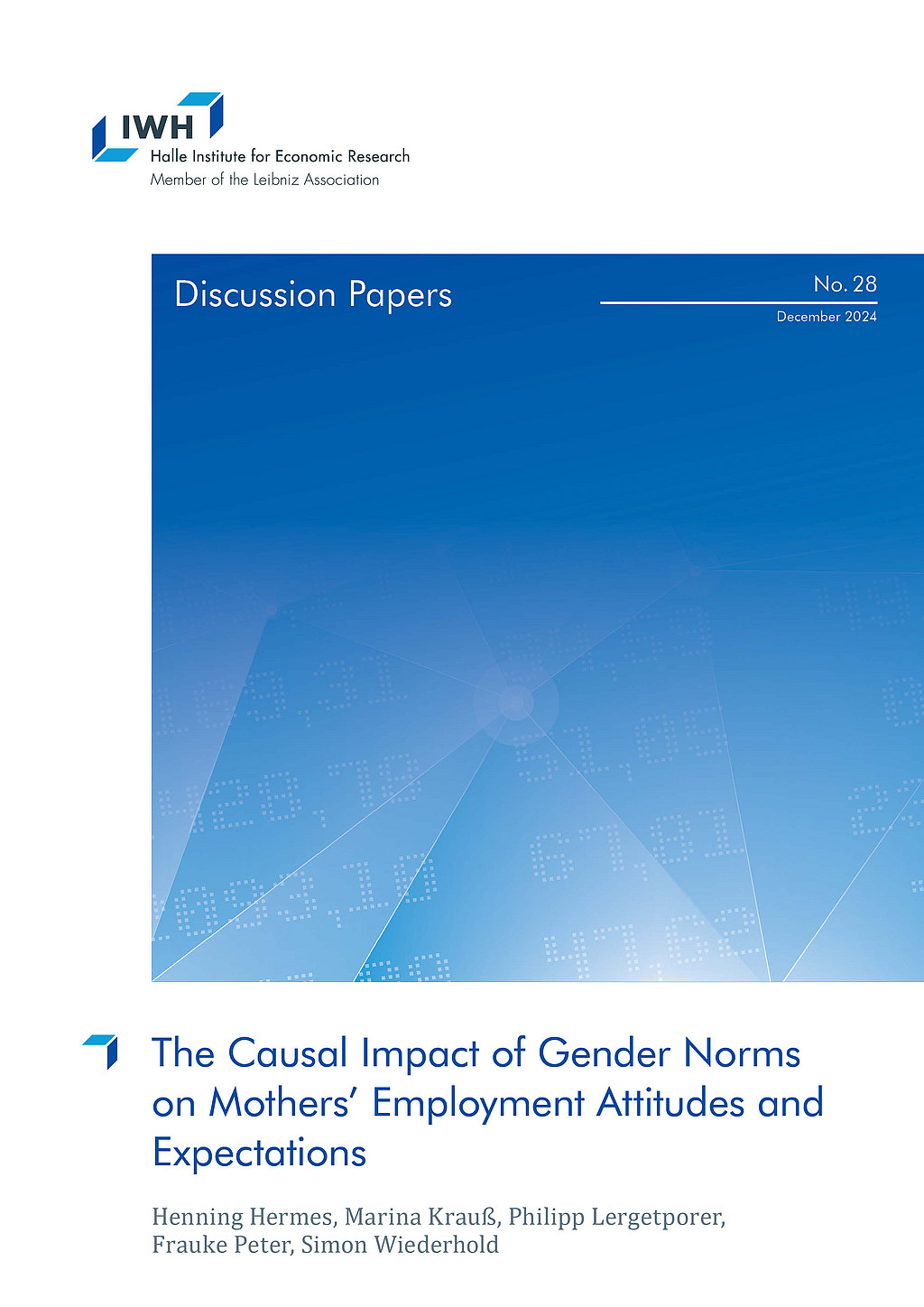
The Causal Impact of Gender Norms on Mothers’ Employment Attitudes and Expectations
in: IWH Discussion Papers, No. 28, 2024
Abstract
<p>This field experiment investigates the causal impact of mothers’ perceptions of gender norms on their employment attitudes and labor-supply expectations. We provide mothers of young children in Germany with information about the prevailing gender norm regarding maternal employment in their city. At baseline, over 70% of mothers incorrectly perceive this gender norm as too conservative. Our randomized treatment improves the accuracy of these perceptions, significantly reducing the share of mothers who misperceive gender norms as overly conservative. The treatment also shifts mothers’ own labor-market attitudes towards being more liberal – and we show that specifically the shifted attitude is a strong predictor of mothers’ future labor-market participation. Consistently, treated mothers are significantly more likely to plan an increase in their working hours one year ahead.</p>
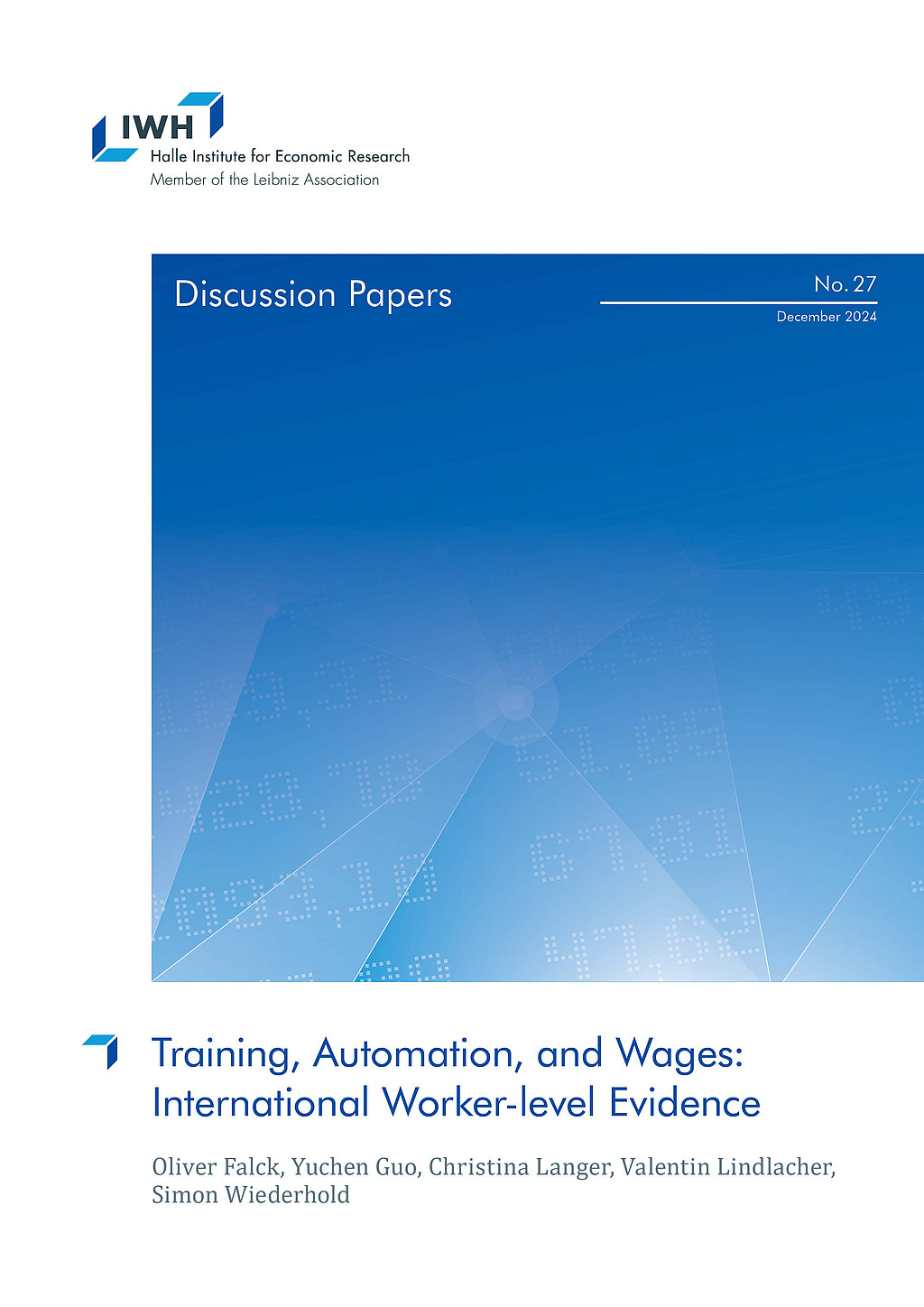
Training, Automation, and Wages: International Worker-level Evidence
in: IWH Discussion Papers, No. 27, 2024
Abstract
<p>Job training is widely regarded as crucial for protecting workers from automation, yet there is a lack of empirical evidence to support this belief. Using internationally harmonized data from over 90,000 workers across 37 industrialized countries, we construct an individual-level measure of automation risk based on tasks performed at work. Our analysis reveals substantial within-occupation variation in automation risk, overlooked by existing occupation-level measures. To assess whether job training mitigates automation risk, we exploit within-occupation and within-industry variation. Additionally, we employ entropy balancing to re-weight workers without job training based on a rich set of background characteristics, including tested numeracy skills as a proxy for unobserved ability. We find that job training reduces workers’ automation risk by 4.7 percentage points, equivalent to 10 percent of the average automation risk. The training-induced reduction in automation risk accounts for one-fifth of the wage returns to job training. Job training is effective in reducing automation risk and increasing wages across nearly all countries, underscoring the external validity of our findings. Women tend to benefit more from training than men, with the advantage becoming particularly pronounced at older ages.</p>
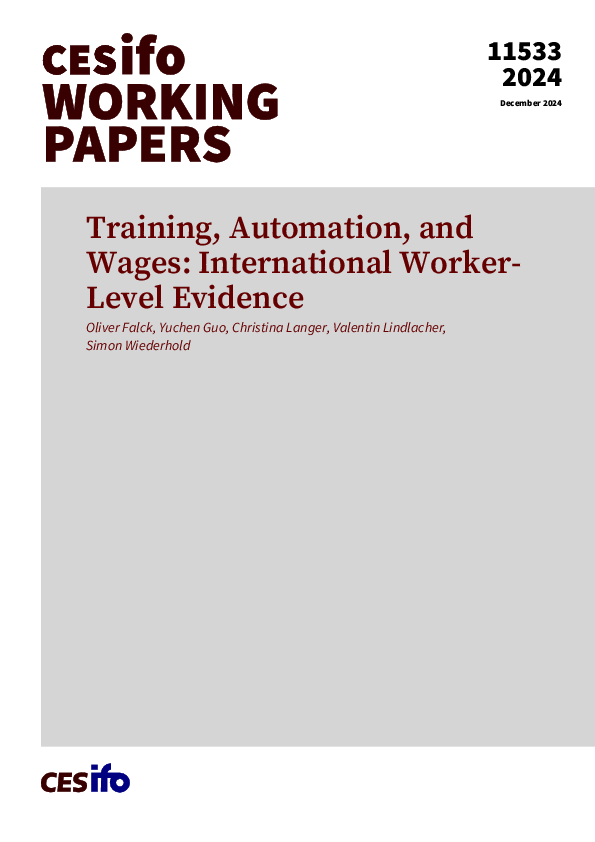
Training, Automation, and Wages: International Worker-level Evidence
in: CESifo Working Papers, No. 11533, 2024
Abstract
<p>Job training is widely regarded as crucial for protecting workers from automation, yet there is a lack of empirical evidence to support this belief. Using internationally harmonized data from over 90,000 workers across 37 industrialized countries, we construct an individual-level measure of automation risk based on tasks performed at work. Our analysis reveals substantial within-occupation variation in automation risk, overlooked by existing occupation-level measures. To assess whether job training mitigates automation risk, we exploit within-occupation and within-industry variation. Additionally, we employ entropy balancing to re-weight workers without job training based on a rich set of background characteristics, including tested numeracy skills as a proxy for unobserved ability. We find that job training reduces workers’ automation risk by 4.7 percentage points, equivalent to 10 percent of the average automation risk. The training-induced reduction in automation risk accounts for one-fifth of the wage returns to job training. Job training is effective in reducing automation risk and increasing wages across nearly all countries, underscoring the external validity of our findings. Women tend to benefit more from training than men, with the advantage becoming particularly pronounced at older ages.</p>
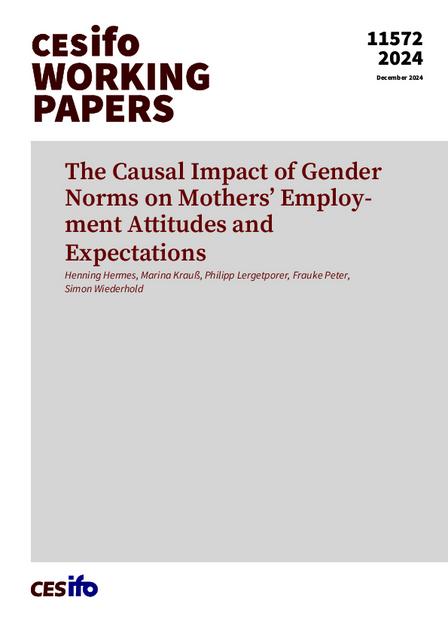
The Causal Impact of Gender Norms on Mothers’ Employment Attitudes and Expectations
in: CESifo Working Papers, No. 11572, 2024
Abstract
<p>This field experiment investigates the causal impact of mothers’ perceptions of gender norms on their employment attitudes and labor-supply expectations. We provide mothers of young children in Germany with information about the prevailing gender norm regarding maternal employment in their city. At baseline, over 70% of mothers incorrectly perceive this gender norm as too conservative. Our randomized treatment improves the accuracy of these perceptions, significantly reducing the share of mothers who misperceive gender norms as overly conservative. The treatment also shifts mothers’ own labor-market attitudes towards being more liberal – and we show that specifically the shifted attitude is a strong predictor of mothers’ future labor-market participation. Consistently, treated mothers are significantly more likely to plan an increase in their working hours one year ahead.</p>
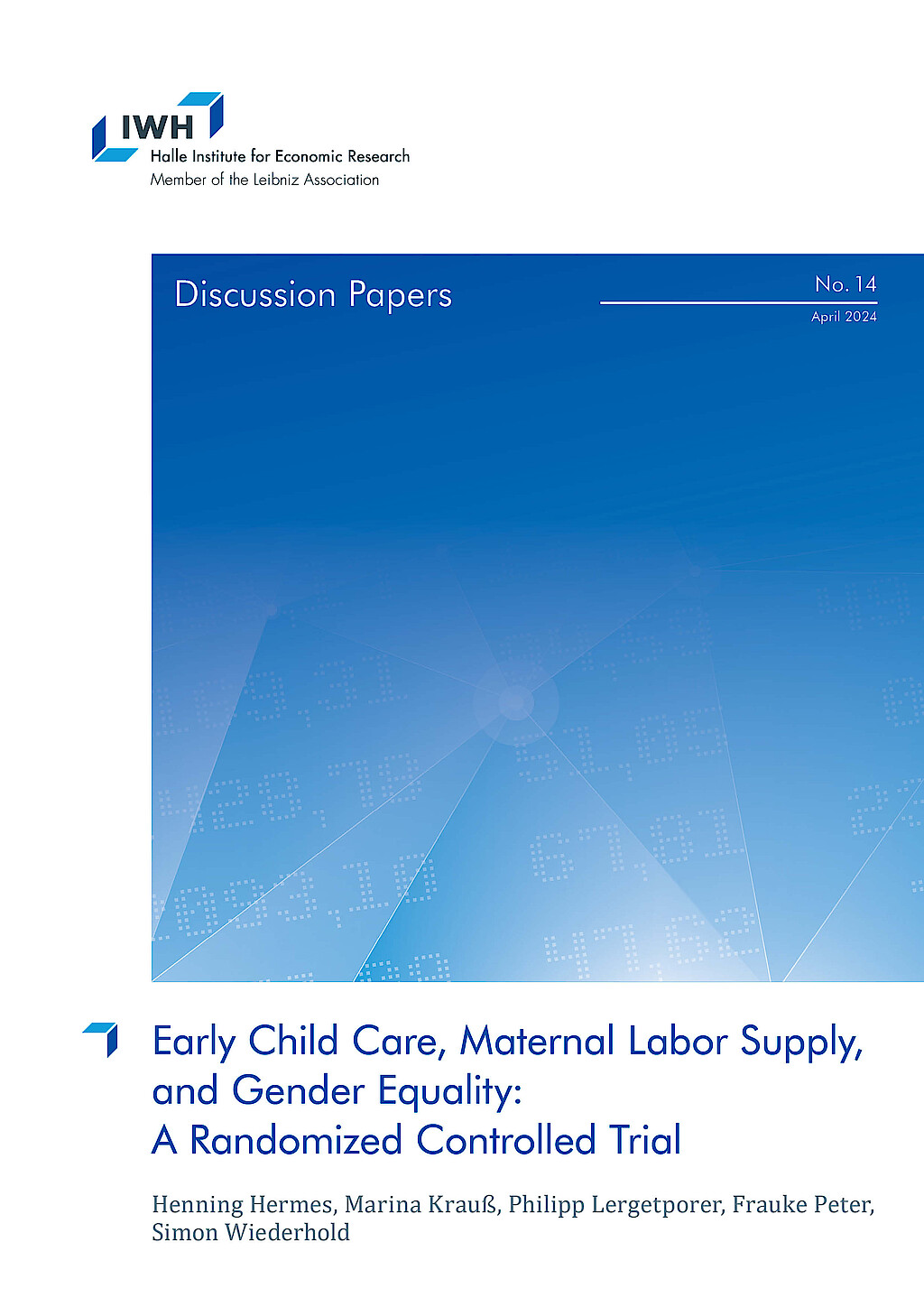
Early Child Care, Maternal Labor Supply, and Gender Equality: A Randomized Controlled Trial?
in: IWH Discussion Papers, No. 14, 2024
Abstract
We provide experimental evidence that enabling access to universal early child care increases maternal labor supply and promotes gender equality among families with lower socioeconomic status (SES). Our intervention offers information and customized help with child care applications, leading to a boost in child care enrollment among lower-SES families. 18 months after the intervention, we find substantial increases in maternal full-time employment (+160%), maternal earnings (+22%), and household income (+10%). Intriguingly, the positive employment effects are not only driven by extended hours at child care centers, but also by an increase in care hours by fathers. Gender equality also benefits more broadly from better access to child care: The treatment improves a gender equality index that combines information on intra-household division of working hours, care hours, and earnings by 40% of a standard deviation, with significant increases in each dimension. For higher-SES families, we consistently observe negligible, insignificant treatment effects.













